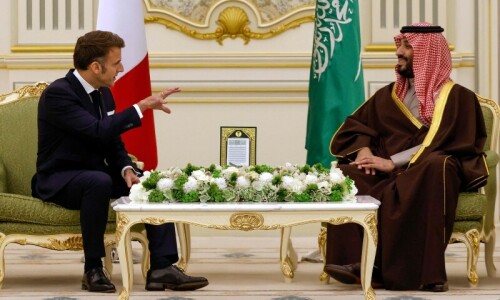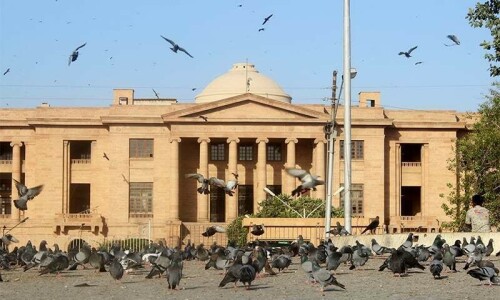
The press in Pakistan has changed enormously over the last two decades but the threats to it have not diminished. If anything, they have multiplied and become more complex than in the past.
Before the 1990s, the main, or perhaps the single most important, source of threats to the freedom of the press was the state and the government. In the era of controlled import and distribution of newsprint through government quotas, strictly regulated and centralised mechanism for allowing new newspapers and periodicals to come out, use of government ads as a political tool of control and subjugation and the hyperactive censorship departments clipping away everything that had any real or perceived impact on the issues even vaguely related to national security and stability – the press never needed any other threat to feel that its freedom across the national polity was bound in chains.
Reporters and editors were frequently arrested, sometimes beaten up and tortured and occasionally even sentenced for making available too much information when it was in the so-called interest of the state to keep it to the minimum.
This monopoly of the state officials and state departments to use power of intimidation – economic or otherwise – and employ force to have their way changed in the 1990s, though for the worse.
After the violent militaristic turn that Pakistan went through under the self-proclaimed religiously guided military dictatorship of General Zia ul Haq, the press witnessed the emergence of many Islamic, sectarian – even jihadist – and ethnic groups a la the Mohajir Qaumi Movement, which brooked no difference and tolerated no criticism even when done constructively.
Torching newspapers before they were distributed, beating up reporters inside their homes and work places, attacking newspaper offices and every now and then murdering journalists became a fashionable way of suppressing the press's right and freedom to know and inform.
While all this was developing into a troubling trend, the government never took a backseat in its attempts to muzzle the press as much as it could, mostly using the quotas of official ads to intimidate newspapers and editors into submission.
Since the 2000s, the government has lost most, if not all, levers of control. The infamous Press and Publications Ordinance – that regulated, monitored and punished the press through issuing and revocation of publication licences – has been done away with.
Trade liberalisation had ended the government's control over the import of newsprint and the evolution of a privatised, market-driven economy – in contrast to the one owned by the stat and run by the government that held sway in Pakistan before the 1990s – meant that quota regime on newsprint and ads no longer made sense as mechanisms for controlling the press.
Any newspaper with money in its coffers can import as much newsprint as it needs and private segments of the economy have become significant enough players to provide the press with a major chunk of its ad revenues.
However, this has not deterred the government from trying to gag the newspapers, intimidate the editors and attack the reporters. But its attempts through such means have become much less successful than in the past. So, perhaps to make up for that lost capacity, the security agencies have increased their potential and capability to threaten and harm the members of the press and in many instances have been directly involved in the torture, abductions, arrests and even murders of some reporters – especially in the tribal areas, Balochistan and some parts of Khyber Pakhtunkhwa -- over the last ten years or so.
The threats to the press from political, ethnic, religious, sectarian and militant groups, in the meanwhile, have also become more numerous and complicated – mainly because of the fragmentation among these groups but also because of the simultaneous decrease in their ability to stand criticism and increase in their power to silence their critics. Like the Mohajir Qaumi Movement split into two factions and religious, sectarian and militant groups have spawned divisions within divisions among themselves, espousing and promoting all kinds of religious and semi-religious causes on the back of their venomous ideologies and even more lethal propensity to use violence as a weapon to propagate and promote those ideologies.
In such circumstances, the press increasingly finds itself on the defensive on a number of issues that have been controversial in Pakistan since 1947, or may be even earlier. One group's 'martyr' is other group's 'devil'. Keeping the balance among conflicting – rather violently clashing – political, ethnic, sectarian and militant narratives, agendas and slogans has become the ultimate test for the press to keep itself safe as well as free in the face of such mounting challenges. This is indeed what walking on the eggshells means.
Two major developments over the last decade or so have also contributed enormously to constricting the freedom of the press. One is the mushrooming of terrorist organisations and their consequent war with the state and the government. Threatened by the terrorists and squeezed by the state, the press continues to oscillate between the two sides while struggling to find a middle course where it can not just protect itself and its workers but also guarantee that its operations remain free from any fear or favor.
The terrorists and the state's security forces have, in fact, made large swathes of Pakistan’s territory a press-free zone. They are also imposing many ideological, theoretical and policy restrictions as well to make it increasingly difficult for the press to maintain its freedom without compromising its safety and vice versa. Sometimes the only information that becomes available is either provided by the terrorists or their nemesis in the state and more often than not it is either incomplete or distorted if not completely false.
The second development is the transformation in the ways and means to transfer information with the advent of the internet and the mushrooming of news-based television channels. Though this 'boom' has benefited the Pakistani press enormously by allowing it to get exposed to international trends, providing opportunities to editors and reporters – both virtually and physically – to travel to other countries, interact with their counterparts and learn new things, its 'beneficiaries' have been only a few and far in between the thousands of new entrants to the press corps, raw from their colleges and universities.
What was once a government-regulated sector in terms of salaries, perks and working conditions of the employees through wage board awards has become a market-driven industry with a perpetually revolving door, with little concern for the exploitative terms and conditions that most of the younger members of the press have to accept to get and keep their jobs. The absence of job security has seriously compromised their ability to maintain their freedom to report and publish on issues that may rubs their publishers and bosses the wrong way.
A side effect of this phenomenon has been the utter lack of professional training for the new entrants into the press and their consequent failure to report on the complex issues with a combination of discretion and informed restraint. More than once, such lack of professional skills and the absence of an informed understanding of the issues have resulted in a reporter or an editor finding him or her on the wrong side of many a powerful interest.
The absence of professional oversight and the sheer disregard of the need to provide them the required social, ethno-linguistic, religious, sectarian as well as political and economic context to their work have led to many instances where reporters and editors may have exercised too much of freedom and indiscretion at the cost of professionalism and restraint. In many instances, they have ended up with bloody noses and bruised faces.
Sometimes this has led to even bigger atrocities and brutalities committed against them which raise the issue of their safety and how the employers have singularly failed to guarantee that. There are virtually no editorial guidelines available to the members of the press working in hostile environments, cases of the employers providing medical and legal aid to the reporters and editors falling victims to intimidation and violence are rare, if any at all, and there is a woeful shortage of safety equipment for those operating from the scene of a gunfire, a bomb blast or a violent public protest.
We certainly have more newspapers, magazines and TV channels and consequently more people working for them. But undoubtedly such numbers are yet to become the critical mass required to ensure the safety and the freedom of the press in the face of all the multiple challenges discussed above.
By no means, the freedom of the press in Pakistan can be guaranteed by raising full-throated slogans to mark the World Press Freedom Day. It is a long drawn out battle that has only half begun.
Badar Alam is editor of the political monthly magazine, Herald.












































Dear visitor, the comments section is undergoing an overhaul and will return soon.